Hidden
Set in 1968, with flashbacks to 1942 and 1947 Warsaw, Poland, it is a story of one man's attempt to discover pieces of his family lost in the Holocaust and the social disruptions following the end of World War II.
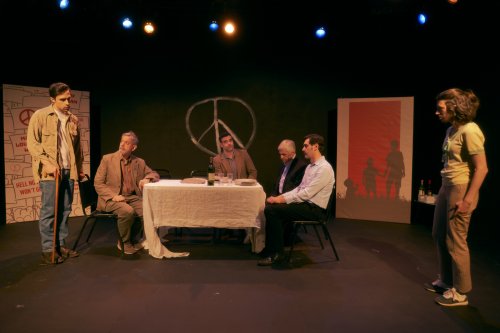
Michael Lopetrone, Michael Gnat, Sean Edward Evans, Mark Friedlander, Jon Lonoff and Eileen Sugameli in a scene from The Playwright’s Gate production of Marc Weiner’s “Hidden” at The 36th Street Theatre (photo credit: Shraya Kag)
[avatar user=”Scotty Bennett” size=”96″ align=”left”] Scotty Bennett, Critic[/avatar]
As we struggle to understand the complexity of human character, there is a constant tension in people between what is considered good and what is considered evil. Our cultural socialization gives structure to our understanding of those aspects of human psychology and how we choose to deal with them in our present, everyday world.
Hidden, written and directed by Marc Weiner, is a powerful play dealing with the complexity inherent in discussing the nature of good and evil. Set in 1968, with flashbacks to 1942 and 1947 Warsaw, Poland, it is a story of one man’s attempt to discover pieces of his family lost in the Holocaust and the social disruptions following the end of World War II. This play is well-written, directed, and acted even with the limitations of the small theater. It is a thought-provoking exploration of a challenging subject. It is highly recommended to anyone interested in experiencing good theater with dramatic impact.
The relationship of two young people whose lives intersect around the ethics and morality of war acts as the catalyst in the play. The story of their relationship is effectively used in unraveling the mystery one of their fathers has been trying to solve for 25 years. They are dealing with the issues of good and evil in the context of the anti-war movement in 1968, and in that struggle for understanding, they discover surprising things about their families that had been hidden for 25 years.
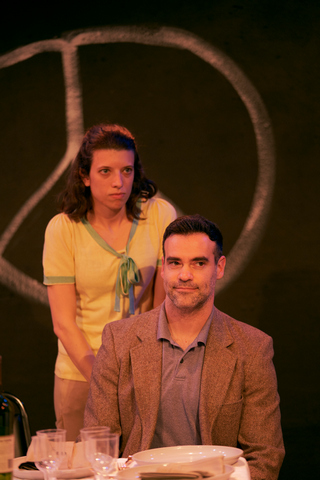
Eileen Sugameli and Mark Friedlander in a scene from The Playwright’s Gate production of Marc Weiner’s “Hidden” at The 36th Street Theatre (photo credit: Shraya Kag)
We meet Jacob Epstein (Michael Gnat), a psychologist, and his son David (Michael Lopetrone), a senior at Columbia University, in the kitchen of the family apartment. David is making sandwiches to take to the students occupying the Low Library at the university who are protesting the Vietnam War. Jacob helps make the sandwiches while discussing David’s reasoning for such an action. Finally, David leaves for the campus, and the scene ends with Jacob receiving a call in the very early morning telling him that David is in a hospital.
This opening is a solid introduction to two pivotal characters. Jacob is superbly performed by Gnat, who provides the character with emotional intensity and thoughtful introspection. Lopetrone gives a solid interpretation of a young, idealistic college student in the throes of the anti-Vietnam War movement in 1968.
The story moves to a hospital, where we meet the rest of the core characters. Nina Reszki, a Columbia University doctoral candidate born in Poland, is expertly played by Eileen Sugameli as a 25-year-old woman whose maturity is mixed with flashes of emotional uncertainty from her youth. As Peter Nowak, Nina’s boyfriend, Mark Friedlander, shows us a mature 32-year-old man with strong ideas about a man and woman’s place in a relationship, which becomes a major factor in Nina’s life. Sean Edwards Evans solidly portrays Joseph Reszki, a Roman Catholic priest and Nina’s brother with a complicated history. The putative father of Joseph and Nina, Dr. Victor Reszki, is smoothly and expertly played by Jon Lonoff. Victor is a man who has kept important details of his children’s history hidden, as well as his dark memories and emotional scars from 1942 Warsaw.
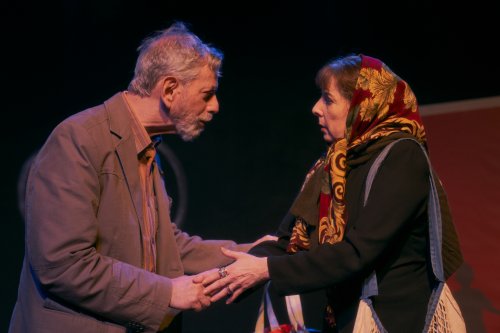
Michael Gnat and Emily Blake in a scene from The Playwright’s Gate production of Marc Weiner’s “Hidden” at The 36th Street Theatre (photo credit: Shraya Kag)
David is in the same hospital at the same time as Nina. He was injured when he acted to save her from being beaten by the police. We meet his mother, Sarah, when she and Jacob show up. Emily Blake, another excellent cast member, plays Sarah. Blake plays three other roles, all of whom figure prominently in the flashback scenes; Magda Reszki, the wife of Victor; Petra, a nanny who cared for the children Jacob Epstein has been searching for in Poland; and Sister Teresa, a nun in a convent in Warsaw who gives Jacob a vital clue to the children’s whereabouts.
The scene in the hospital is crucial in establishing the parameters of the story arc; not only do we meet the central players in the story, but we get critical insight into their perspectives on ethics and morality. It is also a time of discovery where hints of the past emerge from the fogginess of memory and where a chance encounter between Jacob and Victor triggers a flashback to 1942. We learn in that flashback of Jacob making a deal with Petra, the family’s nanny from before the war, to hide his niece and nephews until he could get them out of Warsaw. When Jacob returns to the hospital’s present reality, David tells him that he has the name of the girl he rescued, which Jacob recognizes from his trip to Poland in 1947.
The flashback scenes at various points in the play establish the connection between the two families. It is revealed how after Jacob made a deal with Petra, he witnessed his brother and sister-in-law being killed after a teenager revealed their hiding place to the Gestapo and how Jacob responded. In one of Victor’s flashbacks, a nun from the orphanage where the children are hidden is urging Victor to come to treat a very sick Jewish child. On the way to the convent, Victor sees Jacob’s brother and sister-in-law being killed. In that flashback, Victor tells of dealing with the sick child who only had days to live. Later flashbacks set the stage for future interactions with Victor as the story unfolds. In these flashbacks, the moral and ethical struggles of the two men are found—Jacob for an act of revenge and Victor for an act of compassion mixed with fear.
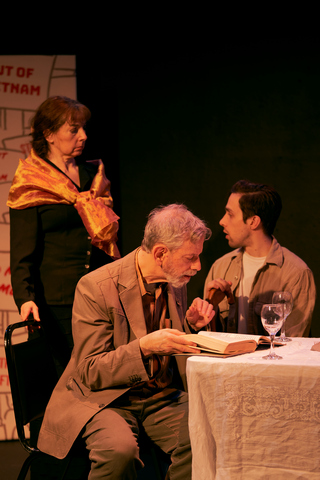
Emily Blake, Michael Gnat and Michael Lopetrone in a scene from The Playwright’s Gate production of Marc Weiner’s “Hidden” at The 36th Street Theatre (photo credit: Shraya Kag
The problem with the flashbacks is the lack of visual cues that it is a different time. This lack is not a major problem, given the overall strength of the narrative, but it should be changed when the play moves to a bigger venue with a larger cast.
The scene after the hospital is of the two families gathering for dinner at opposite ends of the same table representing two apartments. At first, it appears the staging is a function of the limitations of the size of the theater stage, but as the action unfolds, it becomes an effective theatrical device. Each family interacts within their group as the dialogue jumps back and forth between each end of the table, revealing the characters’ inner feelings as they grapple with the events unfolding before them.
The dinner table scene is masterfully directed and performed. The timing and execution of the dialogue are critical to maintaining coherence in the emotions and ideas being expressed. It also strengthens the believability of the characterizations by the actors. Although all the characters are firmly presented as they are introduced in the preceding scenes, this one draws the viewer deeply into the story. This scene is another one where a larger venue could add strength to the action by giving more separation between the two families and allowing for greater lighting flexibility.
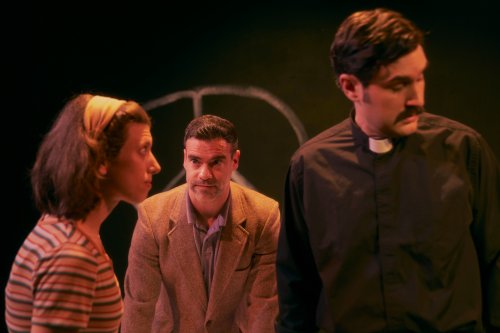
Eileen Sugameli, Mark Friedlander and Sean Edward Evans in a scene from The Playwright’s Gate production of Marc Weiner’s “Hidden” at The 36th Street Theatre (photo credit: Shraya Kag)
The play is structured as a mystery and that is being revealed with sensitivity and care. As each element is shown, a clearer picture of what is at stake emerges. A discussion in Act II about Hannah Arendt’s work “Eichmann in Jerusalem, A Report on the Banality of Evil” triggers a conversation on the meaning of evil. This discussion of the idea of the banality of evil is the thought-provoking idea being acted out in the play: How does one judge what is truly good and what is truly evil?
The set is barebones with a table and some chairs, assorted props to define whether the table is in a kitchen, office, or hospital, and the chairs used to simulate a park bench. Kristen VanDerlyn’s lighting design plays a vital role since the changes in lighting have to support the changes in location of the various scenes and the action within scenes, such as the flashbacks or the dinner table with both families being in different places. Although the use of sound is limited, Shahob Newman uses it effectively in underscoring some of the actions. The pre-curtain music effectively conveys a late 1960’s period, but it would be more effective with a mix that included music from the 1940’s. None of the limitations imposed by the venue detracts from the story’s power. Hidden is a remarkable play that deserves a bigger stage.
Hidden (through May 28, 2023)
The Playwrights’ Gate
The 36th Street Theatre, 312 W. 36th Street, in Manhattan
For tickets, visit http://www.HiddenThePlay.com
Running time: two hours and 30 minutes including one intermission






Leave a comment